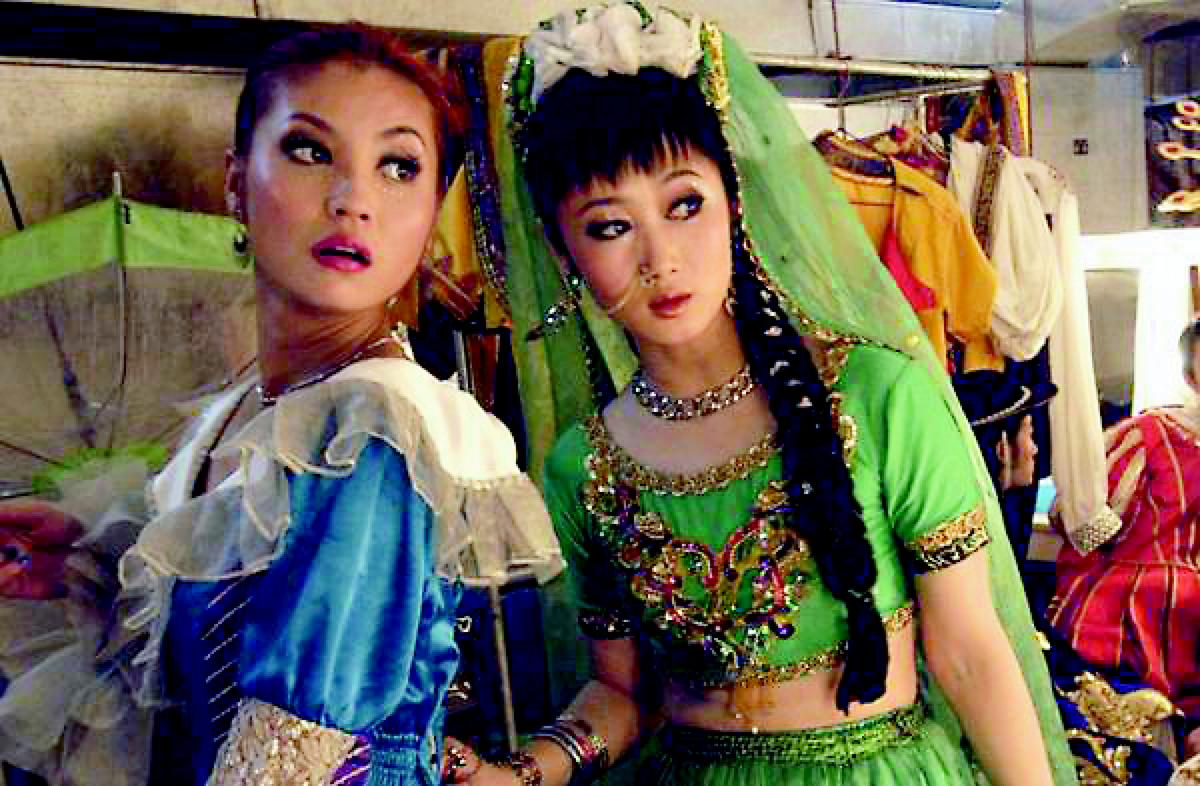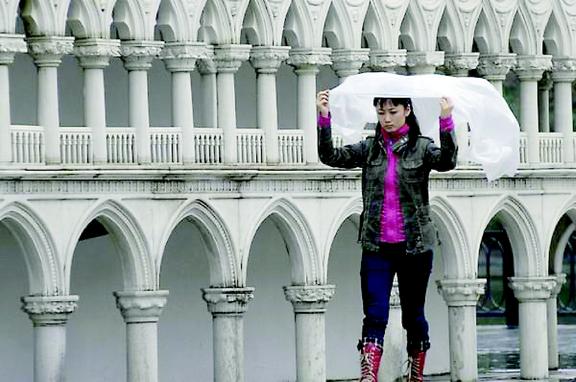The World takes place entirely within Beijing's World Park tourist attraction. The sprawling EPCOT Center-like theme park features miniature reproductions of famed world tourist attractions: The Eiffel Tower, The Leaning Tower of Piza, London Bridge, Manhattan. It is both a glaring symbol of cultural commodification and an image of extreme isolation. “See the world without ever leaving Beijing,” is the cheerful, oft-repeated motto of this real-life theme park. The Communist Dictatorship Lite subtext, of course, is “Whatever you do, don't leave Beijing.”
Using World Park as a backdrop, Zhangke explores the lives of several workers at the theme park, all of whom are impoverished, unhappy and living a life of phony glamor. None of them may have the money (or the connections) to get a visa, but they get to dress up as Egyptian princesses one day or glamorous geishas the next.
There is little to nothing in the way of a plot here. But, over time, we get to know several of the characters as they go through their daily backstage drama. There is Tao (Zhao Tao), the pretty young dancer involved in a not-quite loving relationship with security guard Taisheng (Chen Taishen). Both are from the same small-town region of China. They bond because of their background, but share few intimacies and seem to recall their past as if it were only a vague memory. There's Qun (Huang Yiqun), the dressmaker whose husband escaped to France years ago. She has an affair of sorts with Taisheng, but it is filled with little genuine emotion. There's Anna (Alla Chtcherbakova), a poor Russian girl shipped in to play the part of a Russian in World Park's miniature Red Square. Her passport is taken away from her (for “safekeeping”), and she becomes part of the park's immutable stable of wage slaves. Everyone here seems to be simply a cog in a giant machine. They work, they get drunk, they go home to their shabby little apartments overlooking the neon and fireworks of a world they will never really experience.
The 35-year-old filmmaker's fourth cinematic outing (and the first even remotely embraced by the Chinese government) is a quiet lampoon of China for embracing globalization. World Park features as many ironic visual juxtapositions as a filmmaker could hope for. In a country that routinely wipes out entire cultures just to install a hydroelectric dam, it's a bit bizarre to see these same cultures shipped to the big city to recreate their “traditional” music and dances in a theme park setting. It almost puts one in the mind of Victorian museums, which routinely imported aboriginal people for purposes of display.
World Park is also a fine backdrop for characters who can do little but dream of escape (from drudgery, from unhappiness, from communist/capitalist China). One of the attractions at World Park is an airplane. It doesn't go anywhere. It just sits on the ground. But poor Chinese people can climb on board, fasten their seatbelts and be served drinks by stewardesses. For most, this is as close to air travel as they will ever get. For the characters in The World, the only escape is in threadbare daydreams or death.
Reveling in a melancholy mood (broken occasionally by some animated flights of fancy), The World is a long, slow trip whose appeal may remain elusive even to its biggest fans. (Even reviewers who named it one of the top 10 films of 2005 were at a loss for words.) Its rhythm seems to echo the lunar tides: Either you fall into the film's hypnotic sense of time and place or you fall asleep. Zhangke's taste in humor, drama and social commentary is both quiet and subtle. Showing off the miniature Manhattan skyline, one park guide comments that, “New York lost its Twin Towers on September 11. We still have ours.”
It is in tiny moments that the film becomes deeply human. Late one night, the Russian girl Anna tries to communicate with Tao. They don't speak the same language. But, when Anna pulls out a picture of her two young sons back in Russia, the heartbreaking position she is in becomes abundantly clear. Despite all the setbacks, Zhangke's characters maintain an almost naive sense of hope. Energetic Tao, for example, never stops believing in a better future for herself, even if she can't quite picture what that future would look like. Like Zhangke himself, these characters are trapped between the old world communism of Chairmain Mao and the shiny modern gleam of Western capitalism.




